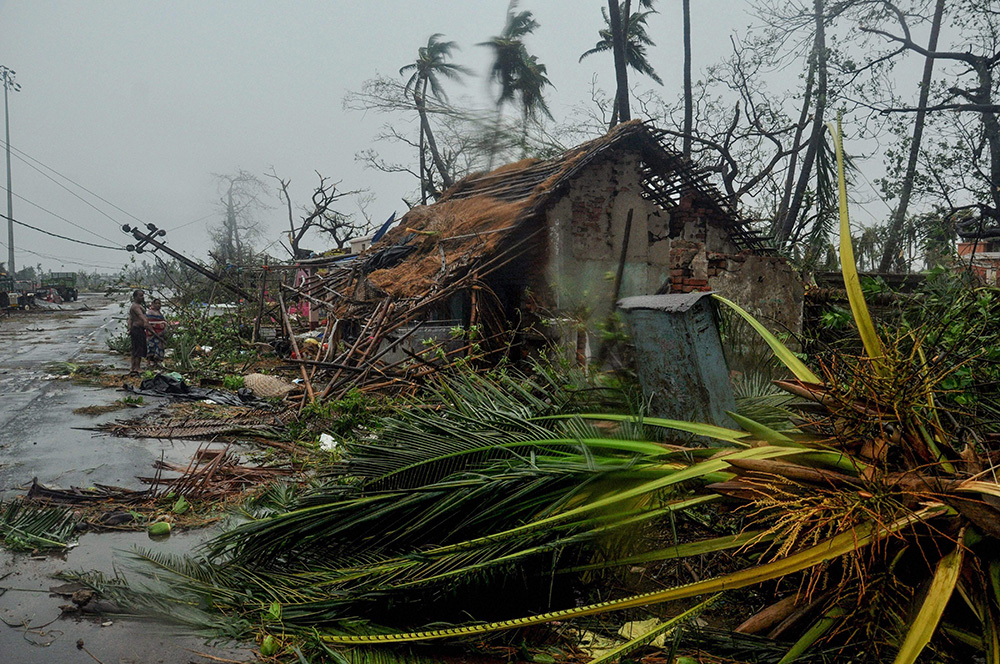
Image source: TNIE
One of the most significant lessons I learned from my mother was the importance of seeking help when needed. This value is often discussed in our organisation, but I learned it firsthand during one of the darkest times in Odisha's history - the Super Cyclone named Fani in 1999.
News journals often cite the super cyclone Fani as, “The 1999 super cyclone had claimed almost 10,000 lives (unofficial accounts say this was a huge underestimate), damaged nearly 20 lakh houses, killed about two lakh livestock, and affected about 2.5 to 3 million people, leaving large tracts of agricultural land unfit for cultivation for a long time due to salinity.”
When the cyclone first hit the east coastal town of Balasore, Odisha, we didn’t notice it. Due to its higher elevation, we were in the town area and weren’t affected much. The first day exhibited some symptoms, such as the electricity going out, the water supply being cut short, and the food supply being cut short. We survived and went through the day with the support available to us. The next day, a few villagers who had been affected due to their village’s proximity to the sea made it to the town, reached our house where I used to work, and shared their struggle, “Nani Apa (Odia word for big sister), there is water everywhere. All the roads have been filled with water. A lot of people died. The roads were invisible and had gone underwater; all one could see was mighty rivers birthed by the floodwater and the little boats being rowed on them.” My mother was worried. But even in the face of such devastation, the community showed remarkable resilience and determination to survive.
My mother went with the government official and other NGO people to see the situation and how the victims would be evacuated and was able to influence government officials to support evacuating the impacted people.
What was the next step for the affected persons after being evacuated? They needed to have some temporary settlement. But then, there were no set or strict guidelines on evacuation and emergencies. Now, it is easy to look at the difference with one of Odisha's most talked about disaster management systems, but it was harder back then. My mother had pioneered the idea of using the colleges as a temporary home for all of them. The entire commerce block of Fakir Mohan College was emptied; everything from the chairs to the tables was moved to the main block, and the commerce block was used in this endeavour.
The death count was high. It is important to influence the individual to go to a new place because it’s better for them. Convincing the individual was also important. How do you explain to a person who’s lost their family, friends, children and everything they knew to move to a better place, leaving behind everything? That was crucial. Thankfully, they were well convinced, and the two affected villages shifted to the college building.
The community went to the Society for HELP to support the cyclone victims with food, clothes, and other essentials. We took sacks and asked the Balasore people to give anything they could. We went to houses, and the residential complexes of factories such as Birla Tyres and Emami, as well as villages and colonies in the town, were not impacted. To sustain these people for a month before the Government could send resources. So, asking for help in this form was to ask for food, not for myself but for the people whose entire lives had been uprooted by the cyclone.
In the next cyclone, I contributed by creating a community of selfless people from all genders who wanted to contribute to and support the government machinery/system by raising funds, food items, and other essentials. We were able to create a space (clubhouse named Shanti Kanan in Balasore) for storage of all the items, and we considered that as a bank and added that whatever international support the government received was also kept in our space; it was an achievement. We, the young people, kept the records and supported them by dispatching the items to impacted areas, the people who visited us, and the people directed to us by the government. That was the first taste of recognition given to us by the community that these people can support us in crisis times. This also led to us being given government initiatives such as polio vaccination drives and supporting the legal documentation to file cases for domestic violence victims. In this process, no finances were involved; only minimal travel and food were given to us by the government.
From that experience, I learnt the importance of seeking HELP when your skills or parameters fall short of helping another person. While listening to those people, I learnt how to listen actively and how you can start sharing and creating a safe space, followed by counselling. At an early stage, I understood that my gender was not a constraint when solving problems. When interacting with the women who had been wronged by their spouses, I could see that their pain was not more than their hunger for justice and hope. Rebuilding from scratch is one of the best things I learned from the cyclone victims. This was also where I learnt that these are my people, my tribe. That is exactly where my MLJP lies, leading me to choose the development sector over the corporate world.
TAGS
SHARE





